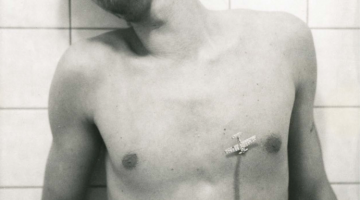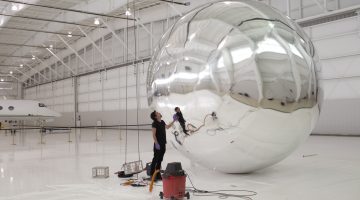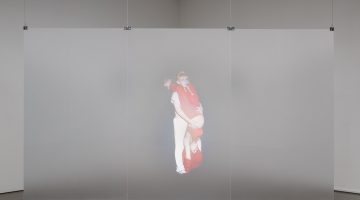The title “Reason Drifts Far From The Shore” is printed in black acrylic on a grey background, centered on the left side of the 48 x 72 inch canvas, on the right side that same black paint pulls its way through the grey in a painterly stroke that drips and switches back on itself. Punctuating the right side is a layer of ten bright dashes that reconfirm the surface as essentially flat. Metaphorically to be “at sea” is to be confused, overwhelmed and at a loss, what happens when reason is set adrift on the unfamiliar and estranged?
The work in the show “Years of Pretty” rides back and forth between a concreteness of the written and the derangement of visual language. Mr. Schumacher’s extensive collection of drips, jabs, slashes swirls, swipes and arabesques cribbed from the abstract lexicon is never secondary to the civilizing nature of text. Unexpectedly the interplay between the two systems of language causes them to take on aspects of the other. In “This May Sound” the text element is so dense and obscured by its own means of production that it shifts away from the verbal integrating itself into the visual structure of the composition.
In “Chrysanthemum” more than half of that single word is crossed out by a brushstroke that swirls off into space. This haptic hop between the flatness of writing and the space of painting draws you into the surfaces black and white layers where acid greens and nearly entirely obscured blues appear. Then you find an in-between color that isn’t red or brown or pink or orange, but could be. There are singular brushstrokes (and potentially other text) buried in the surface, drifting down away from you. Suddenly the language of the brushstroke is working to organize and the drips and gestures of the letters are deranging.
The dumb boxes, as the artist calls them, are sitting on pedestals throughout the gallery. These small squat structures are reconstructions of a project started in the mid-1960’s when the artist first moved to San Francisco. They aren’t exactly sculptures (or boxes for that matter) but not quite paintings either although they could easily be wall mounted. The multiple surfaces on a single object is one of the most important ideas present in the show, showing up also in the hand painted artists books on display in the back room. The multiple picture planes intersecting at different angles can make statements via their objectness as in “Throne for a New Ubu”. They can also be looked at as iterations of the paintings where the painterly space of the two dimensional work has been deranged and cast into the real shared space of the gallery, each surface an analog for a separate layer of paint. The surfaces are handled so deftly everywhere in the show but never so importantly as on the boxes where the light touch with the gesso and the distressed finishes reconfirm flatness. In some places the planes are connected with apertures as in “One-eyed Afternoon”. Packed into the space behind the holes drilled into two of the works sides are precisely cut pieces of cardboard multiplying the potential picture planes of the work. Pushed together so tightly these “extra” surfaces come across as visual promises that will never be filled.
The show has an enthusiasm and generosity that seems at odds with the history of abstraction, so it’s not hard to imagine why Mr.Schumaker would want to set the discourse surrounding abstraction adrift. The work is not some radical staking out of new territory, but it sure does want to move beyond the dirge-like endgame normally ascribed to abstract painting for a chance to describe something else.
For more information visit here.
-Contributed by Matthew Marchand






